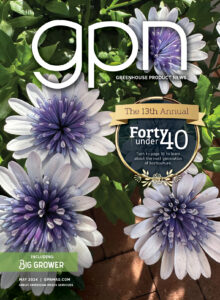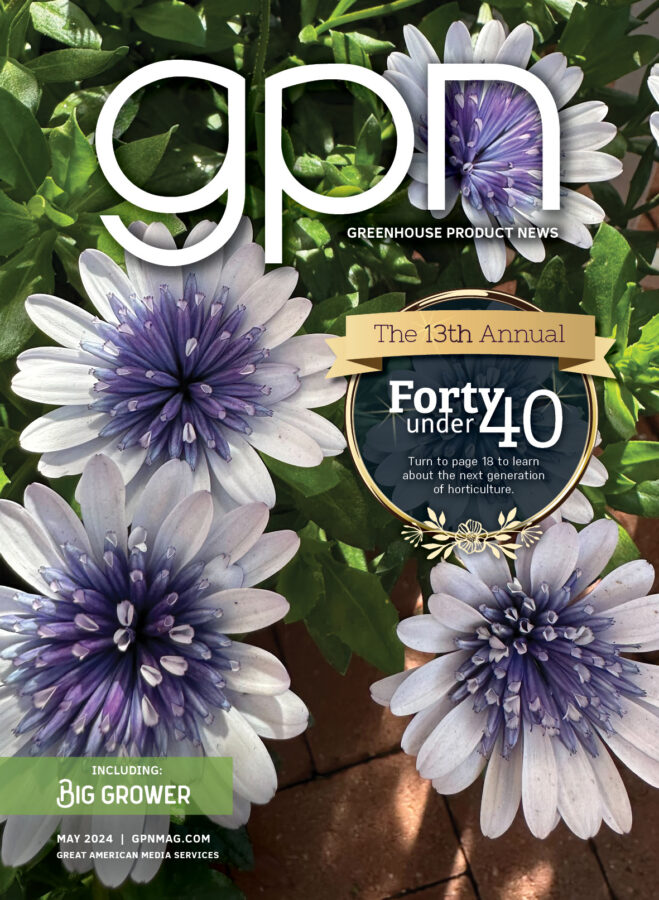Size Control for Lantana
Over the past few years, lantana has become one of the more popular spring crops, with several important uses for the grower and home gardener. Many new varieties with varying growth habit and flower color are now available to sustain its popularity.
Lantana is often used in hanging baskets and combination containers; however, when grown in a 1-gallon or smaller container, even the compact types can become too large. Over the past couple of years, one of the most common questions we have received about this variety is how to use growth regulators on lantana.
Testing different PGRs
This winter, we performed a series of experiments using three different lantana varieties that have varying growth habits. Rooted cuttings of 'New Gold', 'Trailing Lavender' and 'Professor Raoux', all from the Nature's Best line, were obtained and planted in 4.5-inch pots on January 8, 2001. Treatments were applied on January 29. For treatments with two applications, the second application was applied on February 5. Plant width was measured on February 22, and the accompanying pictures were taken on February 25. Plants were grown in a greenhouse in Gainesville, Fla. and received a 20-10-20 fertilizer at 150 ppm with each irrigation.
As can be seen in the pictures and graphs, all of the chemicals were active on lantana, with each chemical providing some size control. A one-spray treatment containing a standard mix of B-Nine/Cycocel at 5,000/1,500 ppm was applied to all three varieties. This treatment produced plants with widths that were approximately 63 percent of the New Gold control plants (see Figure 1), 75 percent of the Professor Raoux controls (see Figure 2) and 67 percent of the Trailing Lavender controls (see Figure 3).
The optimum amount of size reduction for lantana varies greatly with variety, production styles and grower preferences. We will use a reduction of 1/3 for comparisons. For the B-Nine/Cycocel tank mix sprays, approximately 1/3 reduction in size was produced by two sprays at 2,500/1,500 ppm and a single spray at 5,000/1,500 ppm (see Figure 1). Bonzi at 40 ppm produced slightly more than 1/3 reduction in ç plant width on the New Gold plants (see Figure 1).
On Professor Raoux, Sumagic at 20 ppm provided approximately 1/3 reduction in width (see Figure 2). For Florel, two sprays at 300 ppm gave the 1/3 reduction in width (see Figure 2).
The Bonzi and Sumagic rates used in the drench treatments applied to the Trailing Lavender were all too strong and produced plants that were more compact than most growers would desire (see Figure 3).
Which chemical to use
The results of these trials indicate that there is not a simple answer to the question of what provides control on lantana. Several chemicals work Ð the important thing is that you need to use something to achieve the best results. In situations where lantana size will be a problem, and especially for vigorous varieties with long internodes, a growth regulator program should be implemented before the plants become too large.
Growers have a choice of chemicals and strategies for lantana. Since several chemicals are active, growers can use whichever chemical they prefer or are familiar with. Bonzi and Sumagic drenches are obviously very active, so in situations were media applications are more convenient, that is a viable option. Growers will need to evaluate the use of the chemicals under their particular production situation to determine optimum rates and timing of application. The above rates will give you a place from which to start your experiments.


 Video Library
Video Library 




















